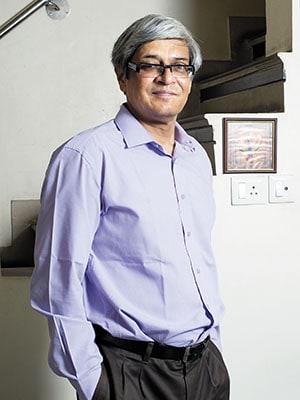
Bibek Debroy: Between the 'Illfare' State and the Deep Sea
Great damage was done by changing the Preamble in our Constitution to make India ‘socialist’. What we have as a result is not a welfare state, but an ‘illfare’ one
Bibek Debroy
Profile: Bibek Debroy is Professor at the Centre for Policy Research, Delhi. He is an economist and has worked in universities, institutes, industry bodies and for the government. He has authored several books and articles, with an interest in trade, education, health, law and governance.
Welfare state’ is an abused expression. Specifics differ across countries and Sweden can’t be placed in the same bucket as the USA. If equity is defined as every citizen obtaining access to basic needs, no one disputes that goal. Problems arise when one fails to target the poor and assumes the state has the capacity to deliver. Sure, the UNDP ranks countries by a human development index (HDI) based on purchasing power parity (PPP), per capita income, education and health. Sure, ‘developed’ countries perform well on HDI and at a rank of 136 (out of 186), India is way down the pecking order. There is a correlation between HDI and per capita income.
India’s per capita income is $1,492. Even if one does PPP conversions, India’s per capita income is $3,830. But governance is more difficult to quantify and pin down. There are some cross-country governance rankings, the World Bank’s governance indicators being one. There is a correlation between governance levels and per capita income too. This is correlation, not causation. While improved governance may lead to higher levels of per capita income, higher levels of per capita income may also lead to improved governance. Therefore, one cannot assume that governance levels in developed countries can be imported and applied in India.
Lant Pritchett (Harvard) coined an expression for India—flailing state. The problem hasn’t been one of enunciating policies driven by equity but administrative incapacity to deliver. John Kenneth Galbraith was anything but a die-hard market fundamentalist and even he castigated India’s ‘post-office socialism’. Those goals of equity concern social sectors. Had we been serious, we would have recognised this and pushed the decentralisation/devolution agenda since, logically and constitutionally, social sectors are state government subjects and should become local body subjects. Improved governance is also correlated with decentralisation/devolution. Instead, there have been a plethora of social sector schemes devised in Delhi.
While all subsidies aren’t Central, 14 percent of GDP is spent on them. Had subsidies led to equity and opened up market opportunities, as they have in other countries, we wouldn’t have debated whether India’s poverty head-count ratio is 22 percent or more. It would have been down to about 5 percent. It shouldn’t be surprising that improvements in India’s HDI score from 1991 have resulted from improvements in per capita income, not that much from health and/or education indicators.

The right debate about MGNREGS is why this scheme was necessary more than six decades after Independence
The mammaries of the Indian welfare state haven’t yielded much milk. If 15 percent of expenditure reaches target beneficiaries, that’s not because of leakage alone. It is also because of the high administrative costs of delivery. There is a predatory political and bureaucratic class that thrives on social sector schemes and subsidies. There is another predatory non-BPL class, typically the urban middle class, that thrives on subsidies meant for BPL (below poverty line). There are several reasons why this leads to distortions.
First, there are fiscal costs to such public expenditure. More importantly, there are forgone opportunity costs of resources. To use the cliché, while one may use a ‘Right to Fish’ statute to give a person a fish a day to eat, lack of expenditure on physical and social infrastructure means the person doesn’t learn how to catch fish. The right debate about MGNREGS is about what these resources might otherwise have been used for and why MGNREGS was necessary more than six decades after Independence.
Second, state intervention messes up price signals and distorts resource allocation. Third, since BPL cases aren’t identified and targeted, it is by no means obvious that a rich to poor redistributive transfer takes place. In all probability, many of the poor continue to be bypassed. Fourth, even if the poor have to be subsidised fiscally, it doesn’t follow that the state has to deliver those goods and services. Choice, competition and efficiency are possible with state financing of alternative channels of delivery. Fifth, in the name of equity, an inefficient public sector has been erected.
India’s tax-GDP ratio, at 18 percent, isn’t that high. It wouldn’t be that high, even if tax exemptions, 5.5 percent of GDP, are completely eliminated. The problem with the ‘illfare state’ isn’t just fiscal and monetary. It imposes inefficiencies and prevents private sector growth. It creates a dole mindset and kills private entrepreneurship. For the corporate sector, it encourages capital flight, where possible. It imposes a debt burden on future generations.
Sweden’s welfare state emerged in the 1950s and 1960s, when tax rates there were low. Today, finding the system unsustainable, Sweden is trying to reduce both public expenditure and taxes. There are two new Gresham’s Laws in policy-making: (1) Good policies drive bad policies out of circulation; (2) For every silly policy one can think of, there will be some precedence in some country in the world.
Great damage was done to India by changing the Preamble to the Constitution to make India ‘socialist’. In our fear that unbridled capitalism would make social mistakes, our ‘illfare state’ has incessantly made capital mistakes. The tragedy is that we haven’t learnt and continue to muddle along. We have neither the capital, nor the social. We only have the ‘ism’.
(This story appears in the 30 November, -0001 issue of Forbes India. To visit our Archives, click here.)





